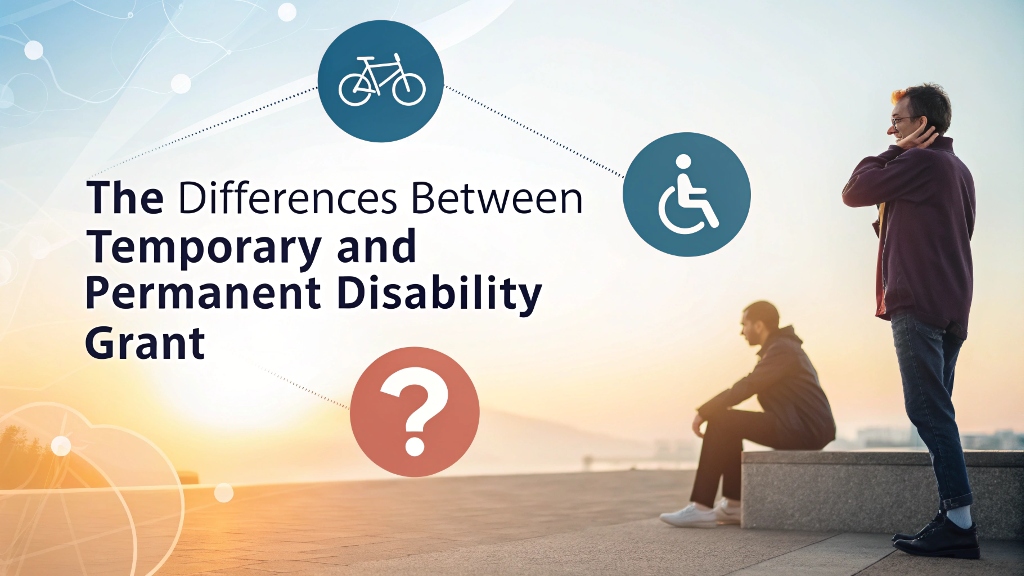Disability grants are a vital form of financial assistance for individuals who are unable to work due to a disability. In South Africa, the South African Social Security Agency (SASSA) provides two main types of disability grants: Permanent Disability Grant and Temporary Disability Grant. Understanding the differences between these grants is crucial for those who need financial support due to a disability.
In this article, we will explore the differences between Permanent and Temporary Disability Grants, including eligibility criteria, application processes, and renewal requirements.
The differences between temporary and permanent disability grant
What Is a Disability Grant?
A disability grant is a form of social assistance provided by SASSA to individuals who have a physical or mental disability that prevents them from working and earning an income. The grant ensures that disabled individuals can afford basic necessities such as food, healthcare, and shelter.
The two types of disability grants are:
- Permanent Disability Grant
- Temporary Disability Grant
While both grants serve the same purpose, they differ in terms of duration, eligibility, and renewal conditions.
1. Permanent Disability Grant
A Permanent Disability Grant is awarded to individuals whose disability is severe and long-term, making it unlikely that they will ever be able to work again. However, the term "permanent" does not mean that the grant will be paid for life. Instead, it refers to the fact that the applicant’s disability is long-lasting and will be assessed periodically.
Eligibility Criteria for a Permanent Disability Grant
To qualify for a Permanent Disability Grant, applicants must meet the following criteria:
- Be a South African citizen, permanent resident, or refugee residing in South Africa.
- Be between the ages of 18 and 59 (individuals over 60 may qualify for an old-age pension instead).
- Have a permanent disability that makes them unfit to work.
- Undergo a medical assessment by a state-appointed doctor to confirm the disability.
- Earn below the income threshold set by SASSA (means test applies).
- Not be receiving any other social grant for themselves.
- Not be cared for in a state institution.
Duration of a Permanent Disability Grant
Although it is called a Permanent Disability Grant, it does not mean the grant is granted indefinitely. SASSA periodically reviews recipients' medical conditions. If an improvement in health is noted, the grant may be discontinued.
Renewal Process
The renewal of a Permanent Disability Grant depends on the medical assessment report. If a doctor states that the disability is irreversible, SASSA may grant the beneficiary a longer-term disability grant without frequent reviews.
2. Temporary Disability Grant
A Temporary Disability Grant is granted to individuals who have a disability that prevents them from working but is expected to improve over time. This grant is meant to provide financial support while the individual undergoes treatment or rehabilitation.
Eligibility Criteria for a Temporary Disability Grant
The eligibility criteria for a Temporary Disability Grant are similar to those for a Permanent Disability Grant. However, the key difference is that the disability must be temporary and expected to improve within a specific period.
Duration of a Temporary Disability Grant
A Temporary Disability Grant is awarded for a period of 6 to 12 months. Once the duration ends, the beneficiary must reapply and undergo another medical assessment if they still require assistance.
Renewal Process
If the disability persists after the initial period, the beneficiary must submit a new medical assessment report and reapply for the grant. However, there is no guarantee that the grant will be renewed, as SASSA assesses each case individually.
Application Process for the Permanent and Temporary Disability Grant
Step 1: Visit a SASSA Office
Applicants must visit their nearest SASSA office to apply in person. If they are unable to do so due to their disability, a trusted individual can apply on their behalf with a letter from the applicant.
Step 2: Medical Assessment
A state-appointed doctor will assess the applicant’s condition and determine whether the disability is permanent or temporary.
Step 3: Submit Documents
Applicants must provide the following documents:
- A valid South African ID (or proof of permanent residence/refugee status)
- A medical report confirming the disability (not older than 3 months)
- Proof of income, assets, and expenses (for means test)
- Banking details (if the grant is to be deposited into a bank account)
- Proof of marital status (if applicable)
Step 4: Means Test
SASSA conducts a means test to assess the applicant’s financial situation. The grant is only available to those who fall below a certain income and asset threshold.
Step 5: Application Processing
After submitting the application, SASSA reviews the documents and medical report. The process can take up to 3 months. If approved, the applicant will start receiving payments monthly. If rejected, applicants can appeal the decision within 90 days.
Final Thoughts
Understanding the difference between Permanent and Temporary Disability Grants is important for those seeking financial assistance due to a disability. While both grants provide essential support, the duration and renewal processes differ significantly. A Permanent Disability Grant is for individuals with long-term disabilities, whereas a Temporary Disability Grant supports those with temporary conditions.
If you or someone you know is in need of a disability grant, ensure that you meet the eligibility requirements and follow the correct application process to receive the necessary financial support. Always stay informed about SASSA updates to avoid missing any important changes to the grant system.
For more information, visit the official SASSA website or contact your nearest SASSA office.
